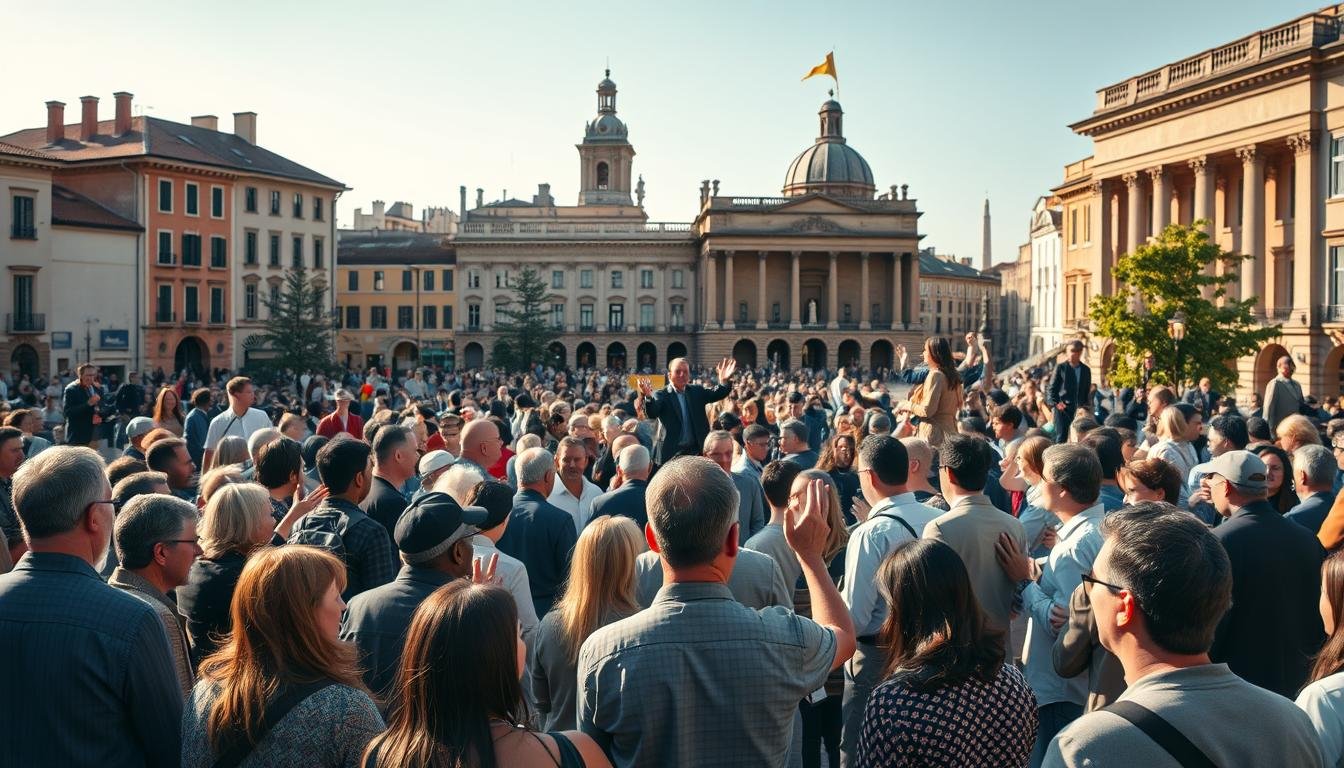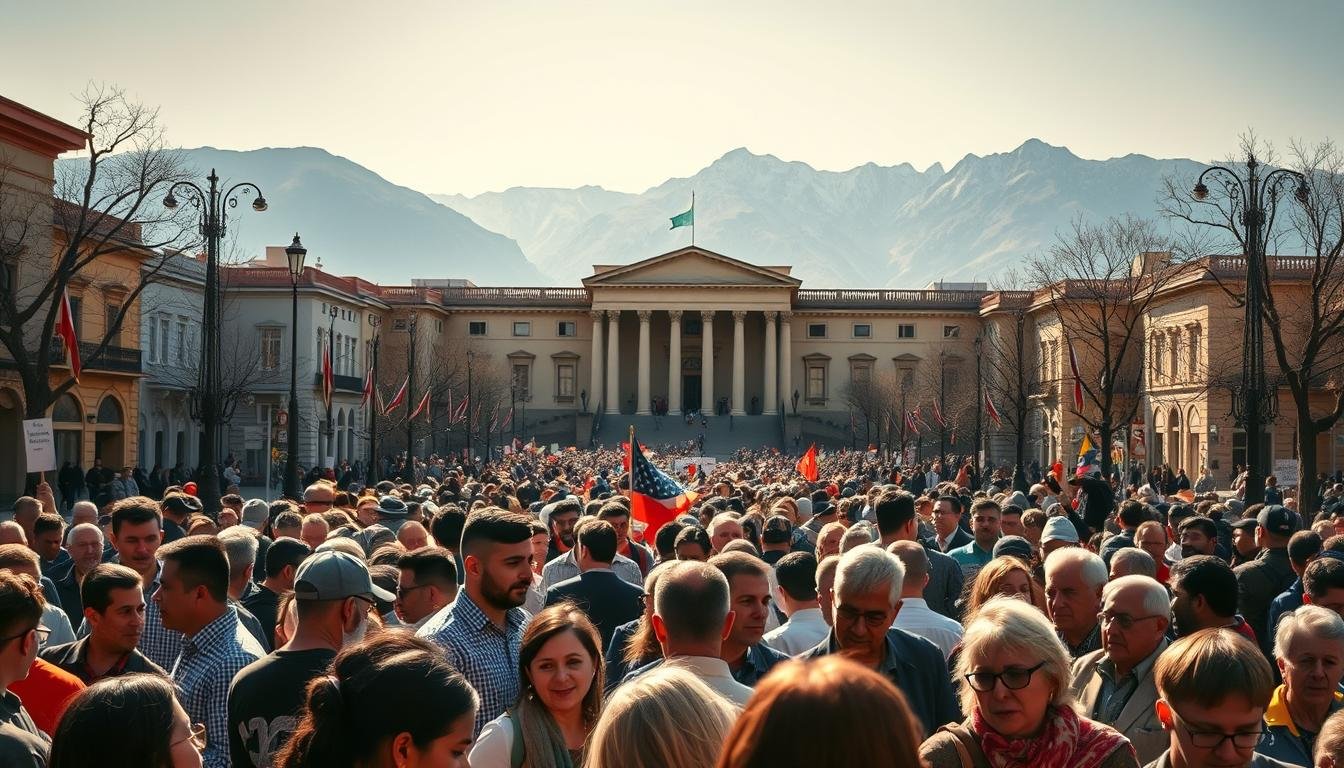Democracy, a system of government, has been key in modern societies. It started in ancient Greece.
The idea of democracy has changed a lot over time. It now shapes how countries are run today.
Knowing where democracy comes from and what it means is important. It helps us see its big impact on today’s world. It’s all about freedom and moving forward.
Key Takeaways
- Democracy originated in ancient Greece.
- The concept has evolved over centuries.
- Democracy promotes freedom and progress.
- Understanding democracy is crucial for appreciating its impact.
- Democracy shapes the way modern nations govern themselves.
The Ancient Roots of Democracy
The democratic principles we value today come from ancient Greek city-states. This link to the past is not just history. It’s a living legacy that shapes our modern governments.
Birthplace: Ancient Greece
Ancient Greece, especially Athens, is where democracy was born. The word “democracy” comes from “demos” (people) and “kratos” (power). It means power with the people. The Athenian democracy, starting in the 5th century BCE, let citizens make decisions directly.
Key Philosophers and Thinkers
Thinkers like Aristotle and Plato were key in shaping democracy. They wrote about governance, justice, and the perfect state. Aristotle’s “Politics” is a key work that looks at different governments, including democracies.
“The roots of education are bitter, but the fruit is sweet.” – Aristotle
The Concept of Citizenship
Citizenship was key in ancient Greek democracy. In Athens, only free-born males could be citizens. They were expected to take part in the city’s politics. This could mean serving on juries, attending assemblies, or holding office.
The idea of citizenship has changed, but its core remains important in democracies today.
| Aspect | Ancient Greece | Modern Democracies |
|---|---|---|
| Citizenship | Granted to free-born males | Universal adult suffrage |
| Participation | Direct involvement in governance | Representative democracy |
| Decision Making | Assembly-based | Parliamentary or congressional systems |
The journey of democracy from ancient Greece to today shows a constant push to improve governance. Keeping these roots in mind helps us understand today’s democratic systems better.
The Evolution of Democratic Principles
Democratic principles have changed a lot over time. This change came from important historical events and new ideas. The move from direct democracy to representative democracy is a big step forward in how we govern.
From Direct to Representative Democracy
In ancient times, like in Athens, people made laws directly. But as cities grew, this method became hard to keep up. Representative democracy came along, making it easier for more people to have a say through elected officials.
Key features of representative democracy include:
- Elected representatives making decisions on behalf of the people
- Regular elections to ensure accountability
- Protection of minority rights
Major Historical Milestones
Many events have shaped modern democracy. The American and French Revolutions were key. They brought new ideas like liberty, equality, and fraternity. These ideas helped make our democratic systems today.
| Event | Year | Impact on Democracy |
|---|---|---|
| American Revolution | 1775-1783 | Established the first modern democratic republic |
| French Revolution | 1789-1799 | Promoted the principles of liberty, equality, and fraternity |
The Role of Revolution in Democracy
Revolutions have often led to big changes in democracy. They push for more people to have a say and challenge old power structures. This leads to more inclusive and fair governance.
The impact of revolutions on democracy can be seen in several areas:
- Expansion of voting rights
- Promotion of social and economic equality
- Institutional reforms
In conclusion, the journey of democratic principles has been shaped by history and the fight for more political involvement. Knowing these changes helps us understand today’s democracy better.
Democracy as a Dialogue
Democracy is all about open dialogue. In a democratic society, people talk, share views, and listen. This exchange is key to a healthy democracy.

Importance of Open Communication
Open communication is the heart of democratic dialogue. It lets people share their thoughts and ideas freely. Civic engagement grows through public forums, media, and social platforms, making sure everyone’s voice is heard.
Good communication also means listening and understanding others. This builds trust and strengthens community bonds, leading to a more united society.
Facilitating Diverse Perspectives
A strong democracy values and includes many viewpoints. By embracing different opinions, democratic societies make better decisions that reflect what citizens want.
Diverse perspectives make democracy richer, encouraging new ideas and progress. They help spot and solve problems, making democracy stronger.
The Role of Debate in Democracy
Debate is vital in democratic dialogue. It lets people engage with various ideas, question common beliefs, and improve their understanding. Through debate, people sharpen their critical thinking and become more active in democracy.
Structured debates on political rights and duties boost civic engagement. They offer a space to delve into complex issues, deepening understanding of democracy and its challenges.
In summary, democracy flourishes through dialogue, needing open communication, diverse views, and debate. By nurturing these, democratic societies can maintain a lively and inclusive political culture.
Freedom and Rights in Democratic Societies
Freedom and rights are key in democratic societies. Here, the balance between personal freedom and the good of all is always being worked out. This balance is vital to protect citizens’ rights and to benefit everyone.
Individual Rights vs. Collective Good
The balance between personal rights and the good of all is a big deal in democracy. Individual rights help us be free and make our own choices. The collective good is about what’s best for everyone. Democracies use laws and checks to keep this balance.
For example, voting is a way for people to use their personal right to help the community. This way, everyone’s voice is heard in shaping society’s future.
The Role of the Constitution
The constitution is very important in democracies. It sets out what rights people have and how the government should work. It also protects against abuse of power and keeps individual rights safe. The constitution is a living document that changes over time.
A strong constitution not only defines government powers but also protects basic rights. This creates a base for fairness and equality in society.
Social Justice and Equality
Social justice and equality are at the heart of democracies. These societies aim to give everyone equal chances and fair treatment. Social justice means fixing unfairness and making sure everyone is included.
| Aspect | Description | Impact |
|---|---|---|
| Legal Equality | Equal treatment under the law for all citizens | Promotes fairness and justice |
| Economic Opportunities | Access to education and employment | Fosters social mobility and reduces inequality |
| Social Inclusion | Inclusive policies for diverse populations | Enhances social cohesion and community resilience |
By focusing on these areas, democracies can strive for a fair and just place for everyone.

The Global Impact of Democracy
The spread of democratic institutions worldwide has ushered in a new era in global politics. As democracy grows globally, its influence on international relations, governance, and individual rights is becoming more important. This section looks at the wide-ranging effects of democracy’s global expansion, showing both its achievements and the hurdles ahead.
Democracy’s Spread Worldwide
Democracy has grown worldwide since the late 20th century. Democratic institutions have been set up in many countries, showing a global move towards more inclusive and representative governments. This change is driven by a desire for political freedom, economic growth, and stability.
Case Studies: Success Stories
Many countries have made the switch to democracy, offering lessons on this journey. South Korea’s move from authoritarian rule to democracy is a prime example of growth in regions once ruled by dictators. Democratic consolidation in Poland and Chile shows how democracy can boost economic development and protect human rights.
Challenges in Non-Democratic Regions
Even with democracy’s global rise, many areas still face big hurdles. In non-democratic zones, authoritarian regimes often block democratic efforts, making it hard to set up democratic institutions. The world community is key in supporting democracy through diplomatic efforts, economic aid, and technical help.
Current Challenges Facing Democracy
La Democrazia faces many challenges today. These issues affect how well democracy works and how much people trust it. They touch on many parts of government and how society comes together.
Populism and Nationalism
Populism and nationalism have grown a lot lately. They often cause politics to become very divided. These movements can harm democracy by focusing on certain groups over others.
Populist leaders use public anger to blame others. This can hurt trust in government and cause trouble in society.
Misinformation in the Digital Age
The digital world has brought big problems for democracy. Misinformation and disinformation spread fast on social media. This can change what people think and who wins elections.
It’s hard to control what’s online because of the anonymity it offers. This makes it tough to fix the problem.
Voter Engagement and Turnout
Getting people to vote is key to a strong democracy. But, many places have trouble getting enough people to vote. This is especially true for young people and minorities.
To fix this, some places have tried new ways to vote and teach people about voting. They want to show how important it is to participate.
By tackling these issues, democracies can get stronger. This will help La Democrazia stay important in today’s world.
The Future of Democracy
The future of democracy relies on its ability to innovate and adapt. As the world changes, democratic systems must also evolve to stay relevant.
New Paths Forward
Using technology in voting can make democracy more efficient and transparent. For example, Estonia has made voting online. This has boosted voter turnout and cut costs.
Empowering Citizens
Creating a democratic culture through education is key. It ensures citizens know their rights and can fully participate in democracy. Programs that teach critical thinking and civic engagement help make citizens more informed and active.
By embracing innovation and promoting civic education, democracy can continue to grow and meet the challenges of today and tomorrow.
Share your photo and get featured on our social media.
Upload now and shine with The Glanz!